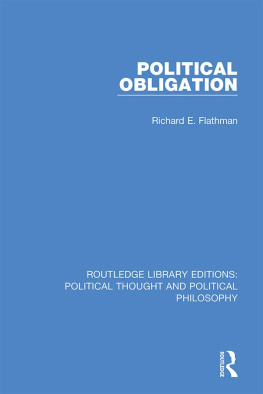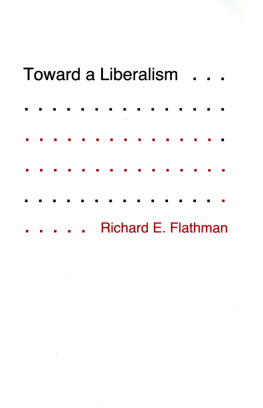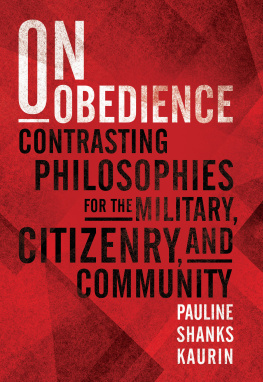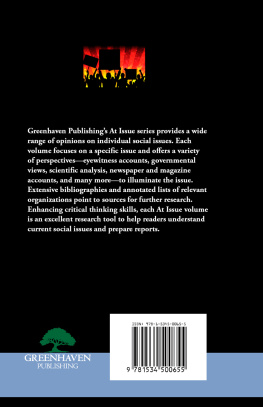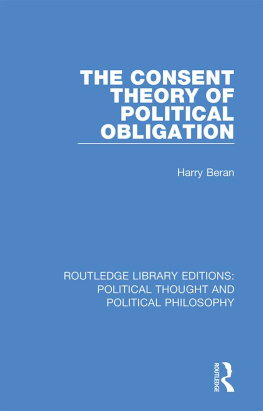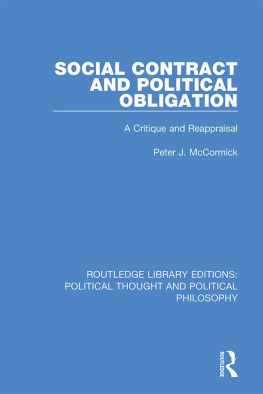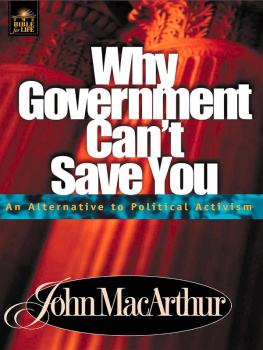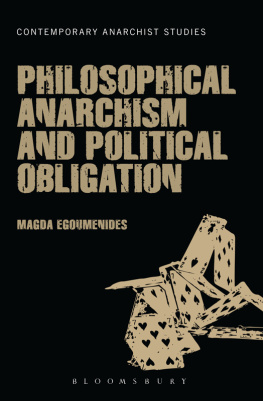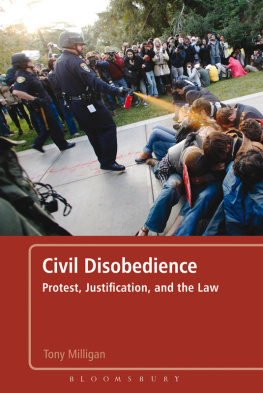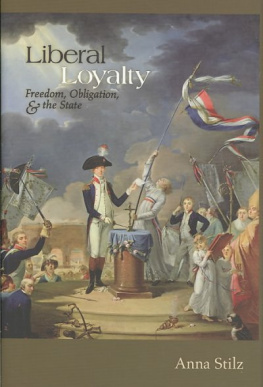ROUTLEDGE LIBRARY EDITIONS:
POLITICAL THOUGHT AND POLITICAL PHILOSOPHY
Volume 21
POLITICAL OBLIGATION
POLITICAL OBLIGATION
RICHARD E. FLATHMAN
First published in Great Britain in 1973
This edition first published in 2020
by Routledge
2 Park Square, Milton Park, Abingdon, Oxon OX14 4RN
and by Routledge
52 Vanderbilt Avenue, New York, NY 10017
Routledge is an imprint of the Taylor & Francis Group, an informa business
1972 Richard E. Flathman
All rights reserved. No part of this book may be reprinted or reproduced or utilised in any form or by any electronic, mechanical, or other means, now known or hereafter invented, including photocopying and recording, or in any information storage or retrieval system, without permission in writing from the publishers.
Trademark notice: Product or corporate names may be trademarks or registered trademarks, and are used only for identification and explanation without intent to infringe.
British Library Cataloguing in Publication Data
A catalogue record for this book is available from the British Library
ISBN: 978-0-367-21961-1 (Set)
ISBN: 978-0-429-35434-2 (Set) (ebk)
ISBN: 978-0-367-36934-7 (Volume 21) (hbk)
ISBN: 978-0-429-35198-3 (Volume 21) (ebk)
Publishers Note
The publisher has gone to great lengths to ensure the quality of this reprint but points out that some imperfections in the original copies may be apparent.
Disclaimer
The publisher has made every effort to trace copyright holders and would welcome correspondence from those they have been unable to trace.
POLITICAL OBLIGATION
Richard E. Flathman
FIRST PUBLISHED IN GREAT BRITAIN 1973
COPYRIGHT 1972 BY RICHARD E. FLATMAN
CROOM HELM LTD
210 ST JOHNS ROAD LONDON SW11
ISBN 0 85664 046 8
All rights reserved.
No part of this publication may be reproduced or transmitted in any form or by any means without permission
PRINTED IN GREAT BRITAIN
BY LOWE & BRYDONE (PRINTERS) LTD., THETFORD
BOUND BY G. & J. KITCAT LTD., LONDON
FOR
Nancy, Kristen, Karen, and Jennifer
Acknowledgments
A N AGREEABLE RESULT of writing this book on obligation is that I have acquired and can now discharge the obligations to express my gratitude to the many persons and organizations who have assisted me.
The generosity of the American Philosophical Society and the Committees on Research of the Division of Social Science and of The College of the University of Chicago helped me meet incidental costs connected with the study and made possible a year of study and reflection in England. Coming at the formative stages of the project, that year was valuable not only for the freedom from other duties which it provided but because it made possible conversations concerning obligation and related problems with, among others, Brian Barry, W. H. Greenleaf, H. L. A. Hart, and above all, J. C. Rees.
Throughout the development of the study, colleagues and students at the University of Chicago sustained what must be a uniquely supportive and stimulating intellectual environment. My work has undoubtedly benefited from that environment in many ways that I never recognized or have forgotten, but I must at least thank Leonard Binder, Gerhard Casper, Harry Kalven, E. W. Kelley, Theodore Lowi, Nancy Hartsock, James Nyman, Frederick Siegler, Herbert Storing, and Aristide Zolberg for their interest and for the ideas and criticisms they contributed. I am particularly indebted to J. David Greenstone and Duncan MacRae, Jr., for many stimulating discussions and for their efforts to improve a long, opaque, and badly organized manuscript.
In their role as editors of the Nomos Series, John C. Chapman and J. Roland Pennock did much to improve a paper on obligations and ideals, and, along with Atherton Press, kindly granted permission to reprint it as Chapter Two of the present book. Michael Walzer read the manuscript for Atheneum Publishers and helped me to clarify my thinking concerning the relationship between consent theories of political obligation and the argument that I try to develop in the following pages. I am also grateful for the searching criticisms provided by anonymous readers of the manuscript, and to Marcella Bryant for her superb work in preparing the manuscript.
My wife Nancy provided not only helpful criticisms of the manuscript at several stages of its development but also the support and encouragement which did much to make writing it a considerable pleasure.
I have quoted short passages from a number of works, and thanks are due to the following persons and publishers for granting permission to do so: The American Political Science Review for permission to quote passages from Hanna Pitkin, Obligation and ConsentII, Vol 60, pp. 3952 (1966). Basil Blackwell for permission to quote a short passage from Elizabeth Anscombe, Intention. Cornell University Press for permission to quote a short passage from Kurt Baier, The Moral Point of View. Routledge and Kegan Paul and Humanities Press for permission to quote a short passage from Peter Winch, The Idea of a Social Science. Macmillan Company, London and Basingstoke, The Macmillan Company of Canada, and St. Martins Press, Inc., for permission to quote passages from Ludwig Wittgenstein, Philosophical Investigations and from Friedrich Waismann, The Principles of Linguistic Philosophy. Methuen & Co. for permission to quote from P. F. Strawson, Introduction to Logical Theory. The Clarendon Press, Oxford, for permission to quote passages from H. L. A. Hart, The Concept of Law and a passage from R. M. Hare, Freedom and Reason. Oxford University Press of New York for permission to quote a passage from Joseph Tussman, Obligation and the Body Politic and short passages from the paperback edition of Alexander Sesonske, Value and Obligation. Full references to the quoted passages are provided in the appropriate footnotes.
Portland, Oregon
July 20, 1970
Contents
U NDER WHAT CONDITIONS are obedience and disobedience required or justified? To what or to whom is obedience or disobedience owed? What are the differences between authority and power and between legitimate and illegitimate government? What is the relationship between having an obligation and having freedom to act? What are the similarities and differences among political, legal, and moral obligations?
The foregoing are among the questions that arise under the rubric of political obligation. Their importance, both from the standpoint of the practical concerns of the citizen and the theoretical concerns of the political philosopher, requires no demonstration.
These questions have been discussed by most of the great political philosophers of the western tradition. Much can be gained by examining their discussions and we will do so at various junctures in this work. But the concern of the great political philosophers with these questions, and the answers they gave to them, although no doubt heavily influenced by the discussions of thinkers who preceded them, were rooted in features of the political societies in which they lived and of which they knew. Aristotle, Hobbes, and Hegel learned much

